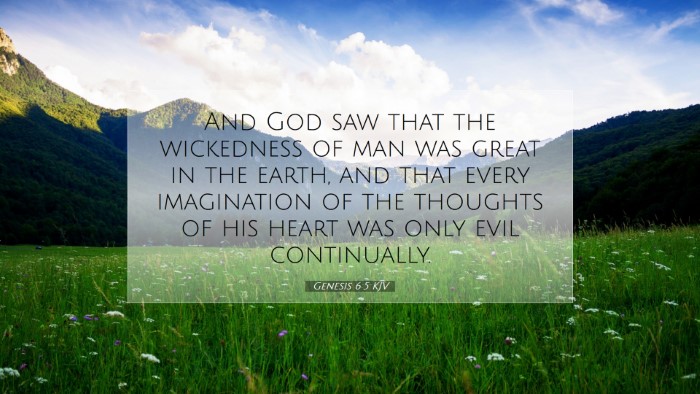Commentary on Genesis 6:5
Genesis 6:5 states: "Then the LORD saw that the wickedness of man was great in the earth, and that every intent of the thoughts of his heart was only evil continually." This verse presents a grim assessment of human nature leading up to the great flood. By examining the depth of the original Hebrew language and correlating insights from various public domain commentaries, we can derive a profound understanding of the theological implications.
Overview of the Verse
In this scripture, we witness God's response to the pervasive wickedness that engulfed humanity prior to the flood. The declaration that “every intent of the thoughts of his heart was only evil continually” speaks to an inherent moral depravity that necessitated divine intervention. The context of this verse is crucial, as it serves as a pivotal moment in biblical narrative, bridging the creation and the eventual renewal of humanity through Noah.
The Nature of Human Wickedness
The phrase “the wickedness of man was great” can be dissected through several commentary lenses:
-
Matthew Henry: Henry underscores the scale of human depravity, emphasizing that it was not merely individual acts of sin but a systemic failure of the heart's intentions. He posits that this reflects the total corruption of humanity, whose very thoughts are steeped in evil.
-
Albert Barnes: Barnes points to the continuity of evil in human thoughts—an uninterrupted stream of malice and negativity. He highlights that God’s omniscient observation led Him to conclude that humanity’s intentions were perpetually immoral, shedding light on divine justice.
-
Adam Clarke: Clarke emphasizes the active role of human choice in this wickedness, asserting that the heart, which is the seat of emotions and decision-making, had aligned itself entirely against God. This indicates a significant anthropological aspect of sin, where free will has led to dire consequences.
Theological Implications
The evaluation of human wickedness in Genesis 6:5 serves several theological purposes:
-
The Nature of Sin: This verse establishes a foundation for understanding the pervasive nature of sin. As noted in the commentaries, it is not just actions but the intent behind those actions that God scrutinizes. Sin is presented as an intrinsic condition of the heart.
-
Divine Justice: God's decision to bring a flood is framed as a just response to humanity's rebellion. It illustrates the balance between God's mercy and His righteousness, providing a narrative that highlights the severity of sin.
-
The Need for Redemption: The characterization of humanity’s condition sets the stage for God’s redemptive plan through Noah and ultimately through Jesus Christ. The ensuing genealogy post-flood shows God's continued involvement and grace despite human failures.
Comparative Analysis with Other Scriptures
This verse resonates with several other passages throughout the Bible, illustrating a consistent theme regarding human nature:
-
Jeremiah 17:9: "The heart is deceitful above all things, and desperately wicked; who can know it?" This parallels Genesis 6:5, reinforcing the notion of the heart's wickedness.
-
Romans 3:10-12: "As it is written, There is none righteous, no, not one." This New Testament reflection echoes the Old Testament perspective, showcasing human unworthiness and the universality of sin.
-
Matthew 15:19: "For out of the heart proceed evil thoughts, murders, adulteries, fornications, thefts, false witness, blasphemies." Here, Jesus elaborates further on the sinful nature rooted in human thoughts, establishing a continuity of biblical theology regarding human sinfulness.
Practical Applications for Faith Communities
The implications of Genesis 6:5 extend beyond theological discourse into practical areas for pastoral ministry and community life:
-
Self-Examination: Faith communities are encouraged to engage in introspection, recognizing the potential for evil intent within themselves and fostering a spirit of repentance.
-
Community Accountability: Just as the collective wickedness led to divine judgment, communities may benefit from establishing accountable partnerships to cultivate a culture of righteousness.
-
Hope in Redemption: The narrative serves as a reminder of God’s ongoing mercy and opportunity for redemption, encouraging believers to share the hopeful message of deliverance through Jesus Christ.
Conclusion
Genesis 6:5 is a sobering reflection on the state of humanity. Interpreted through the insights of Matthew Henry, Albert Barnes, and Adam Clarke, it reveals the seriousness of sin, the nature of the human heart, and the profound consequences of turning away from God. As believers navigate this complex moral landscape today, the principles drawn from this verse remain ever relevant, calling for a faithful response to the divine offer of grace and transformation.


